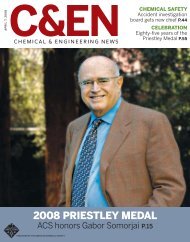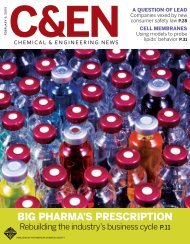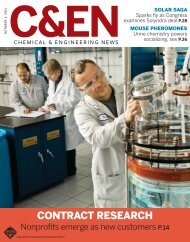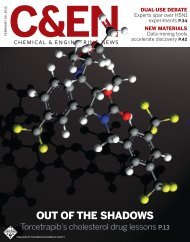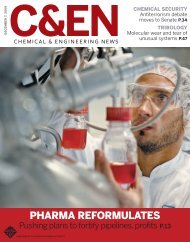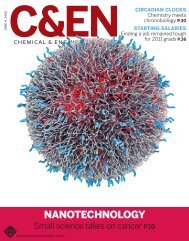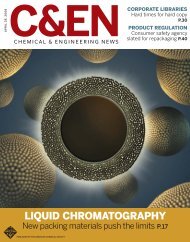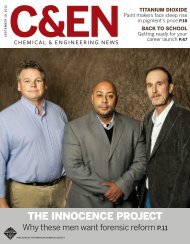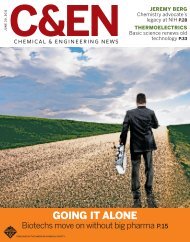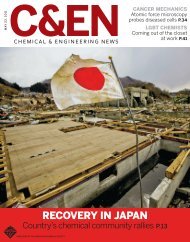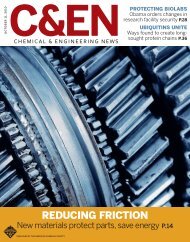February 27, 2012 - IMM@BUCT
February 27, 2012 - IMM@BUCT
February 27, 2012 - IMM@BUCT
You also want an ePaper? Increase the reach of your titles
YUMPU automatically turns print PDFs into web optimized ePapers that Google loves.
NEWS OF THE WEEK<br />
UNCERTAIN PATH<br />
FOR H5N1 RESEARCH<br />
POLICY: A closed-door meeting and a<br />
vague statement from an international<br />
panel muddy the road ahead<br />
HOW TO MOVE forward with controversial research<br />
on the H5N1 avian flu virus, including<br />
publication of two papers reporting on recent<br />
experimental work, has grown murkier in the wake of a<br />
Feb. 17 statement from the World Health Organization .<br />
According to WHO, an expert panel it convened<br />
“reached consensus on two urgent issues related to<br />
the newly created H5N1 influenza viruses: extending<br />
the temporary moratorium on research with new<br />
laboratory-modified H5N1 viruses and recognizing that<br />
research on naturally occurring H5N1 influenza virus<br />
must continue in order to protect public health.” The<br />
statement also says that the panel supports full publication<br />
of two research papers on the work, accepted<br />
by Nature and Science , “however, there are significant<br />
public health concerns surrounding this research that<br />
should first be addressed.”<br />
“I am not sure exactly what the decision means<br />
because it’s qualified,” said Bruce M. Alberts, editorin-chief<br />
of Science , at a hastily assembled news briefing<br />
in Vancouver, British Columbia, on the same day WHO<br />
released the statement. Alberts agreed to talk to the<br />
press at the American Association for the Advancement<br />
of Science annual meeting, in part to squelch rumors<br />
concerning the paper Science controls. The journal is<br />
published by AAAS.<br />
The WHO panel of experts met behind closed doors<br />
at WHO headquarters in Geneva on Feb. 16–17. WHO<br />
required each expert, including the primary authors of<br />
the Science and Nature papers, to sign a confidentiality<br />
agreement barring them from open discussion of the<br />
deliberations. Public fear about avian flu along with the<br />
panel’s detailed review of the unpublished experimental<br />
work—deemed “dual use” and thus dangerous—<br />
dictated the secrecy, WHO says.<br />
At the AAAS press briefing, Alberts revealed that<br />
Science and Nature had been planning to publish in<br />
mid-March redacted versions of the two papers that<br />
describe experiments to artificially mutate the H5N1<br />
virus, making it more contagious<br />
and virulent. Under<br />
this plan, the journals would<br />
have been following the recommendations<br />
of the U.S.<br />
National Science Advisory<br />
Board for Biosecurity ( C&EN,<br />
Feb. 6, page 6 ). NSABB Acting<br />
Chair Paul Keim of Northern<br />
Arizona University was a<br />
member of the WHO panel.<br />
“Certainly now that’s not<br />
going to happen,” said Alberts,<br />
referring to the March<br />
publication plan.<br />
In a statement, Nature Editor-in-Chief<br />
Philip Campbell, who was a member of the<br />
WHO panel, said: “Discussions at the WHO meeting<br />
made it clear how ineffective redaction and restricted<br />
distribution would be for the Nature paper. It also underlined<br />
how beneficial publication of the full paper<br />
could be. So that is how we intend to proceed.”<br />
Alberts was less definitive: “My reading is that both<br />
Nature and Science are to wait until we get some further<br />
information from WHO and other authorities about<br />
when, in fact, we are to publish the full manuscripts.”<br />
But WHO is not dictating decisions for Science ,<br />
Alberts insisted. Instead, “we’re allowing them to say,<br />
‘Delay publication until issues are resolved.’ ” It is<br />
reasonable, Alberts said, that public fears about the research<br />
be addressed first. — WILLIAM SCHULZ<br />
AAAS<br />
Alberts<br />
PHARMACEUTICALS Food & Drug Administration acts to ease cancer drug shortages<br />
FDA has taken steps to boost the supply<br />
of two critical cancer drugs—Doxil and<br />
methotrexate—both of which have been<br />
facing nationwide shortages.<br />
FDA will temporarily allow importation<br />
of the unapproved drug Lipo-Dox, from<br />
India-based Sun Pharma, as a replacement<br />
for Doxil, FDA Commissioner Margaret<br />
A. Hamburg announced on Feb. 21.<br />
FDA has also fast-tracked the approval of<br />
preservative-free methotrexate from APP<br />
Pharmaceuticals, and the agency is working<br />
with other companies to ramp up production<br />
of methotrexate, Hamburg said.<br />
FDA’s latest actions add to a growing<br />
list of measures the agency has taken<br />
since President Barack Obama signed an<br />
executive order last October to alleviate<br />
the growing problem of drug shortages in<br />
the U.S. Those measures include developing<br />
a database to track drug shortages,<br />
sharing information with the Justice Department<br />
to address stockpiling of drugs<br />
and exorbitant pricing, and collaborating<br />
with industry and other stakeholders.<br />
There has been a sixfold increase in<br />
the number of firms voluntarily notifying<br />
FDA of potential drug shortages since the<br />
executive order. Despite the increase, FDA<br />
fully supports legislation, H.R. 2245 and<br />
S. 296, that would require manufacturers<br />
to report all drug shortages to the agency<br />
and would give it enforcement authority.<br />
“We know that advanced notification<br />
works. But to truly be most effective,<br />
Congress must grant FDA the authority<br />
it needs to require notification for all<br />
lifesaving drugs,” Rep. Diana L. DeGette<br />
(D-Colo.), sponsor of H.R. 2245, said in a<br />
statement. “And manufacturers that do<br />
not comply should be penalized for putting<br />
patients at risk.” — BRITT ERICKSON<br />
WWW.CEN-ONLINE.ORG 9 FEBRUARY <strong>27</strong>, <strong>2012</strong>



